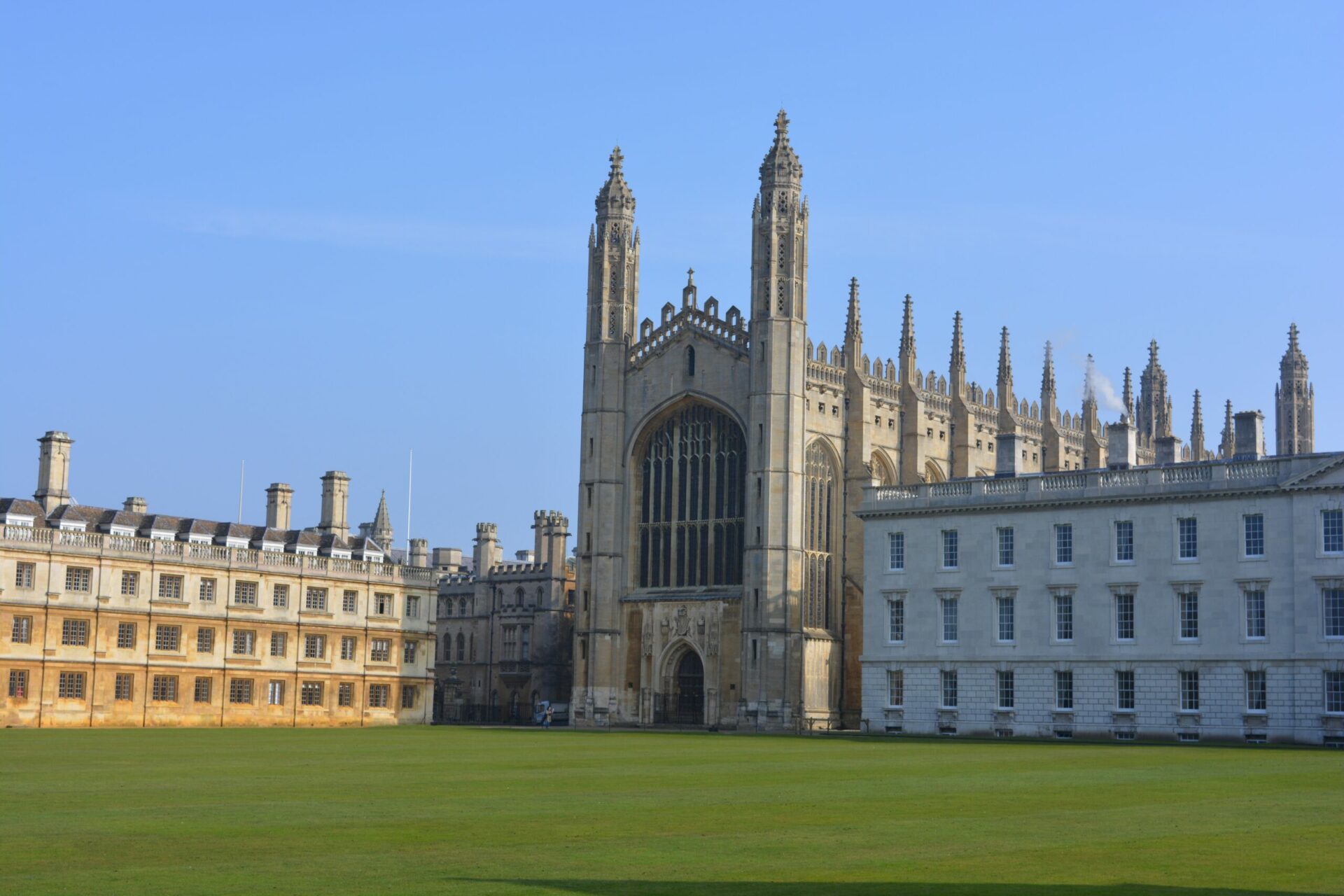
If you’re dreaming of becoming a Cambridge University student, then you’ll have to prepare yourself for a tough interview. In this article, you can explore 70 Cambridge interview question examples and of course, tips on how to answer them. There’s a high chance you’ll encounter some of these in your interview.
The University of Cambridge is a world-renowned international organization providing the highest standard for global excellence in research and learning. It has been making hugely significant contributions to society for the past 800 years.
If you’re considering a preview of Cambridge life before applying, attending a Cambridge summer school is a great way to immerse yourself in university-level academics. Experiencing Cambridge in a summer setting can give you insight into what interviewers may value in applicants.
And if you’re successful in your application, you may join the ranks of the 110 Nobel Prize Winners and 47 Heads of State it has nurtured throughout the years.
70 Cambridge Interview Question Examples

Cambridge Questions Requiring Self-Reflection
- If you were the interviewer, would you let yourself in?
- How intelligent are you?
- What does ‘success’ look like to you?
- Who is your biggest influence?
- How will you contribute to this university?
- Why do you want to go to university?
- Should everyone go to university?
- Why are you here?
- What will you choose: party or library?
- How will you cope with the pressures of this university?
Cambridge Interview Question Examples Requiring Estimation
These questions test your critical thinking, mathematical reasoning, and communication. They might seem easy – until you realise you’re not allowed to Google them!
- How many tennis balls are sold in the UK every year?
- How much would it cost to fill an Olympic swimming pool with milk?
- What percentage of the UK population is wearing socks right now?
- What percentage of a human’s lifetime is spent blinking?
- How many people are walking on the streets of Cambridge right now?
- What percentage of the world’s population has access to the internet?
- How much money is generated by the global fast-food industry each year?
- Estimate the number of new books published worldwide each year.
- How many letters are sent through the Royal Mail each day?
- How many words have been spoken in human history?
Chances to Show Off Your Cambridge Interview Research
Before attending your interview, you’ll have read about the subject, course, college and wider university. Sometimes, the interviewer decides to test this knowledge!
- Tell me about the course you’re applying for.
- Do you know who I am?
- Why this college?
- Who is the most influential figure in your field of interest today?
- Why is this a good place to study your subject?
- Have you read about any of the professors or researchers here? Whose work inspires you most?
- If you could ask a question to the leading expert in your field, what would it be?
- What resources or facilities at the college or university do you think you’ll make the most of?
- What’s a common misconception about your subject that you’d like to correct?
- What’s a research paper or article that changed how you think about your subject?
Big Questions
These questions dig into your values and get to the bottom of who you are and where your priorities lie.
- What superpower would you choose?
- If you could change one thing about the world, what would it be?
- What would you do with a million pounds?
- If you could live in any era of history, which would it be and why?
- What do you think humanity will achieve in the next 100 years?
- If you could ask one question and be guaranteed an honest answer, who and what would you ask?
- What has been the greatest challenge you had in life? How did you deal with it?
- Have you ever lied? Is it possible to lie without realizing it?
- What mystery keeps you up at night?
- What problem would you spend your life solving?
Examples of Questions Designed to Give You the Floor
Flexible questions like these should be considered a great chance to show off. You can pick an answer that allows you to talk about a topic you’re an expert in.
- What did you read today?
- What news story is capturing your attention right now?
- What should I ask you about?
- What’s the best piece of advice you’ve ever received?
- What’s the most interesting thing you’ve learned by accident?
- Do you have political views?
- What’s something you’ve noticed recently that most people overlook?
- What’s something you’re currently obsessed with, and why?
- If you could teach me about one topic, what would it be?
- What’s the most interesting conversation you’ve had recently?
Practical Cambridge Interview Question Examples
Sometimes, your interviewer might use items in the room to pose a question. Pick up something in your room and try and answer these questions with it in mind!
- What are you holding?
- Imagine you’re on the phone to a friend. How would you describe this object?
- Find something in this room that interests you.
- If this object were made of a different material, how would its function change?
- What could this item be used for that it isn’t typically designed for?
- Take a closer look at this object. What do you think was the most difficult part of making it?
- How would you improve this item to make it more efficient or useful?
- If this object were discovered by an alien civilization, what might they conclude about us from it?
- What assumptions do we make about how this object works, and are they always correct?
- What role does this object play in everyday life, and how might that change in the future?
Abstract Cambridge Interview Question Examples
These are the questions that are most famously associated with Oxbridge interviews!
- If the only things you’d ever seen were three yellow lemons, would you assume (a) everything is yellow or (b) everything is a lemon?
- Can a text ever be better once translated out of its original language?
- What would happen if gravity stopped working for an hour each day?
- Could a society function without the concept of numbers?
- If dreams could be traded, what might their value depend on?
- What parts of a city or buildings correspond to which parts of speech like verb, noun, adjective? For example, you could say that verbs are roads.
- If animals could talk, would their conversations be more like poetry or mathematics?
- What is the history of the colour pink?
- What would music sound like if humans had no emotions?
- Who should we credit as the author of an AI-written novel?
Tips On How To Answer Cambridge Interview Questions

Scanning through Cambridge interview question examples can quicken the heart rate. You might not know the right answer immediately – you might even suspect that there isn’t a right answer! Lucky for you, help is here. Check out these practical tips to help you nail your interview like a pro.
Answer Cambridge Interview Question Examples Aloud
While you were scanning through the questions, did you know how you’d answer them? If you were to answer the questions aloud, will your answer be coherent and engaging? You’d be surprised at how your answers may deviate from the actual question.
But don’t be discouraged, all of us get sidetracked from time to time. Especially when our thoughts fly ahead while our mouths are struggling to catch up!
That’s why you need to practice with Cambridge interview question examples. Pay close attention to your sentences. Do they make sense together? Is it easy to understand? Tweak your answers until they become as concise as possible.
Review Your Personal Statement
Your personal statement is your golden ticket to admissions. In it, you’ve written the most crucial reasons why you’re worthy of becoming a Cambridge student. The interviewer would like to find out if you are who your personal statement says you are.
Be ready to embody your personal statement.
That is, be yourself!
Of course, you can’t avoid forgetting some specific detail here and there, especially if you haven’t read it for a while. Make sure you also review the materials you’ve cited in your personal statement. Your interviewer might want to get more insight about them.
Keep Reading
You need to stock up on knowledge related to your course. A good place to start? Check out the course outline on the official Cambridge site. What subjects do they mention?
If you’re planning to take Architecture, you’ll need to read up on architectural history, principles of construction, and environmental design. For Computer Science, subjects include foundations of computer science, Java, and interaction design.
Start searching for journal papers, news articles, and go-to books related to your course.
Even if your interviewer ended up not asking you questions about what you read about, you’d benefit from improving your vocabulary. Making it easier for you to construct your sentences and explain yourself. Trust us, you’ll need it!
Practice Talking About Your Course
You have a brilliant mind. But the question is, how will the interviewer know that if you can’t express yourself? Practice talking to people. Engage in meaningful discussions related to your course.
Don’t hesitate to approach people who are interested in the course you’re planning to pursue. Your friends, batchmates, and teachers are great people to approach. But strangers are the best! Why? Because you need to practice talking to someone you’re not comfortable with.
Joining summer schools according to your interests can be a great way to start. For example, joining a law summer school in Cambridge or a Cambridge medicine summer school can be a great way to learn the concepts and theories involved in such disciplines.
Further reading: How to Answer Common Interview Questions
How do you talk to someone you just met? Can you express to them your passion for your course? The more you practice, the more your confidence will grow. On the day of your interview, talking to someone you just met will feel more natural to you.
Get Comfortable with Not Knowing
Answering a question aloud by thinking out loud involves breaking your thought process into clear, logical steps as you tackle the problem or idea. Start by restating the question to ensure clarity, then outline any assumptions you’re making, the knowledge you’re applying, and how you’re piecing it all together. This shows not just your conclusion but how you arrived there, highlighting critical thinking and adaptability.
Categories like Estimation Questions, Abstract Questions, and Practical Interview Questions particularly require this approach. These questions are less about the “right” answer and more about demonstrating your reasoning, creativity, and ability to engage with complex or unusual ideas under pressure.
Get Feedback
There’s only so much you can see about yourself. If you need constructive criticism to help you improve fast, set up mock interviews with your friends. Ask them to ask you random Cambridge University interview questions. Answer them as if it’s the real deal.
Then ask them for their feedback. Take note of their observations. What are the most common points of improvement people say you need to work on? Focus on these points and work on them.
Do the mock interview again and ask them if there were any changes. Repeat the process until you get better. Don’t stop practising!
Prepare Your Questions
The interview is a conversation, not an interrogation. While your interviewer will ask you questions, your turn will come. You’ll also have to ask your questions in turn.
Asking questions is a sure sign you’re invested in becoming a Cambridge student. It means you’ve given Cambridge much thought and you want to know if the school has what you need to help you succeed in your long-term plans.
If you need ideas on what questions to ask at a university interview, then check out our article.
Get To Know Your Potential Interviewer
Research the tutors of your course. Find out their interests, achievements, contributions, and field of expertise.
The more familiar you become with them, the more comfortable you’ll be during your interview. What’s more, they’ll be impressed that you did your due diligence! Feel free to tell them what you appreciate about their work, and what trait they have that inspires you.
Remember, the interview is a conversation among human beings. Not an interrogation! So treat it as such.

Wrapping Up
There you have it! You have 70 Cambridge interview question examples to practice with. Plus, you have practical tips to help prepare you for your interview. All that’s left to do now is to act.
Start today and keep going! We at Immerse Education wish you the best of luck.
Join the Immerse Education 2025 Essay Competition
Follow the instructions to write and submit your best essay for a chance to be awarded a 100% scholarship.



























